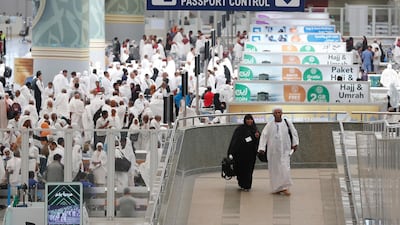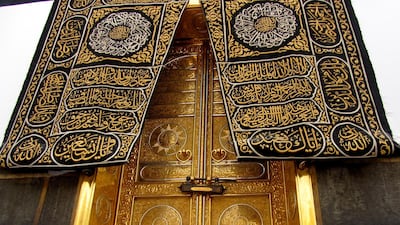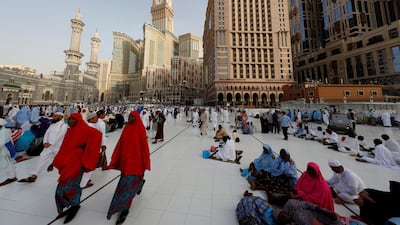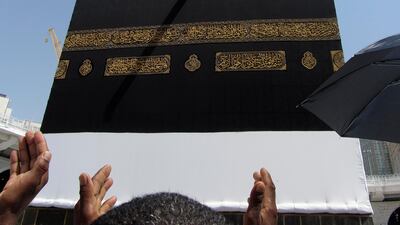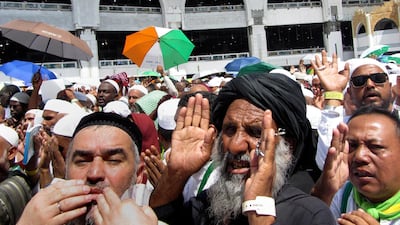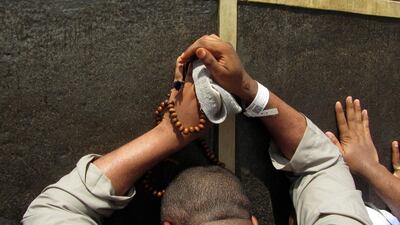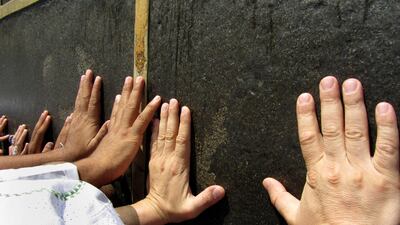Over the next two days, the last of the hundreds of thousands of pilgrims to arrive in Saudi Arabia will land at a purpose-built terminal in Jeddah to begin a journey undertaken by millions before them.
The first steps on to the tarmac at King Abdulaziz International Airport will be the first of a 1,400 year old journey for the two million pilgrims due to perform Hajj this year
They come spiritually and physically prepared, dressed in white garments to strip themselves of their status as they go to face their creator in a state of ihram.
For some, it is a yearly occurrence, for others, it will be the first time they arrive at an airport, coming from more than 150 countries and speaking languages from around the world but all with the single purpose of completing a gruelling 5-day pilgrimage that will test their patience and their faith.
The namesake of the airport made strides to modernise the pilgrimage, turning it into a logistical marvel. This responsibility was inherited by King Salman, custodian of the holy mosques, who takes it upon himself, attending hajj nearly every year, to ensure the journey is a safe one for the millions who will make it.
Over the next few days, Hajj Terminal will be one of the busiest arrival terminals in the world with up to 78,000 people expected to fly in each day.
"The terminal has four sections for the hajjis which can receive about 4,000 people at the same minute," Maj Gen Sulaiman Al Yahya, head of the Special Saudi Delegation and director general of Passports, told The National.

The 510,000 sq m structure, designed to look like Bedouin tents to mimic the tent city of Mina, opened in 1981 to facilitate the arrival of an ever-growing number of pilgrims. During peak season, the terminal can accommodate 312 daily flights and last year hit a record of 78,000 arrivals in a single day.
“We exceed the number of hajjis this year by 120,000 people for the same time last year. Until now about 1.8 million pilgrims have arrived in Saudi Arabia,” said Maj Gen Al Yahya.
Pilgrims come from around the world, many will be coming off a plane for the first time and some even lose their passports or bring the wrong paperwork,
“We try to accommodate them all. Hajj itself is difficult so we try to make the journey as easy as possible.”
Immigration officials use a sophisticated system to process passports at a speed of no longer than 40 seconds per person. In that time, a pilgrim’s biometrics are registered and their photo is taken.
Since 2016, the number of passport counters has more than doubled from 144 to 300. More than 2,000 passport control officers — of which a third are women — speaking a total of 10 languages cover three shifts at the round-the-clock terminal

“[This is] so the hajis won’t be afraid that there is nobody to translate or understand what they want,” said Maj Gen Al Yahya.
Technology at the airport continues to improve each year to cope with the influx of pilgrims. In 2017, Saudi Arabia inaugurated Makkah Route, an initiative to speed up travel into the Kingdom for pilgrims from two countries, Indonesia and Malaysia. This year it was broadened to include pilgrims from Tunisia, Pakistan and Bangladesh.
“The Makkah Route lets the pilgrims finish all the procedure of their hajj in their country before they depart for Saudi Arabia,” Mag Gen Al Yahya said.
“The customs, immigration, luggage and health check is all done in their home country, so once they board the plane, they are treated like a domestic traveller.”
Makkah Route travellers also bypass having to wait for their luggage, which is delivered to their address in Makkah or Madinah. The service was used by more than 25,000 pilgrims this year.
More than 821,000 pilgrims have passed through the Hajj Terminal since the season began on Dhu Al Qidah 1 [or July 1]. Upon arrival, the travellers continue to the holy city of Makkah, 70km away from Jeddah.
This is Fahad Al Zaharni’s first year at the Hajj Terminal and he has already seen people of all ages and backgrounds arrive at the airport.
The immigration officer, 25, recalls stamping the passport of a 60-year-old Libyan man who reacted emotionally.
“He looked at me and said ‘jazak Allah khair, brother’ [may God reward you with goodness] and started crying. He said he had been waiting his whole life for that stamp.
“You see happiness in everyone arriving even those that have travelled a long distance,” Mr Al Zaharni said.
Hugging his mother as they waited for their luggage, Mohamed Yakoob, 35, said he had not slept in three days after his flights were delayed.
“My first flight from US to Egypt was delayed by six hours, so I couldn’t rest at my home in Egypt. And then my flight from Cairo to Jeddah got also delayed,” he said.
Though his eyes were red, Mr Yakoob appeared determined.
“Finally I’m here, I’m at the airport. I’m so excited, I don’t care how long it took me to get in here. It feels good to be here. I’m so excited to perform hajj and to see Kaaba.”
